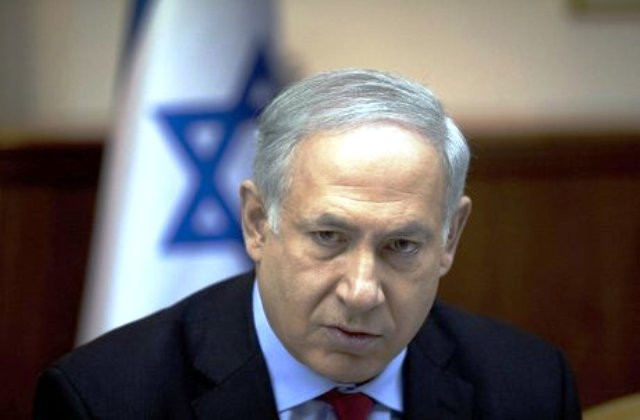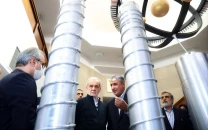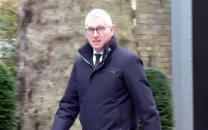Hezbollah may get chemical arms if Assad folds: Netanyahu
Israel and the White House fear Syria's weapons would be left unguarded once Assad's regime collapses.

Hezbollah may get chemical arms if Assad folds: Netanyahu
Interviewed on the U.S. "Fox News Sunday" television program, Netanyahu said Syrian President Bashar al-Assad's government would fall and that he was worried that a chaotic "regime collapse" might leave Syria's weapons sites unguarded.
"We certainly don't want to be exposed to chemical weapons falling into the hands of Hezbollah or some other terror groups. ... It's a great threat," he said.
"We will have to consider our action. Do I seek action? No. Do I preclude it? No," Netanyahu said when asked whether Israel would act alone or prefer the United States to take the lead.
U.S. Senator John McCain said that in addition to the Israeli concerns, there was a risk that the Syrian government might use chemical weapons against its opponents.
"These are helicopter gunships, tanks, artillery that are slaughtering people, and now there is a risk - and I'm not saying it is going to happen - a risk that in his desperation, Bashar al-Assad might use those chemical weapons," McCain, the 2008 Republican presidential nominee, said on CNN's "State of the Union with Candy Crowley."
White House Press Secretary Jay Carney told reporters traveling with President Barack Obama on Air Force One that the chemical weapons arsenal appeared still to be under the Syrian government's control. But a concerned Washington was monitoring the stockpiles and consulting with Syria's neighbors, he said.
"We believe that Syria's chemical weapons remain under Syrian government control," Carney said. "But given the escalation in violence, and the regime's increasing attacks on its own people, we remain very concerned about these weapons."
Israeli Defense Minister Ehud Barak said on Friday that Israel would consider taking military action if needed to ensure Syrian missiles or chemical weapons do not reach Hezbollah.
Hezbollah, which in the past has received military and financial support from Syria and Iran, launched thousands of mainly short-range rockets into Israel during the Jewish state's 2006 offensive in southern Lebanon.
'20 PLOTS IN LAST 2 YEARS'
Netanyahu reiterated Israeli charges that Hezbollah and Iran were behind a suicide bombing in Bulgaria last week that killed five Israeli tourists. Iran has denied any involvement.
"I know based on absolutely rock-solid intelligence that this is Hezbollah and this is something that Iran knows about very, very well," the prime minister said.
Asked if he could give any hard evidence linking Wednesday's bombing at Bulgaria's Burgas airport with Hezbollah, Netanyahu said his government would share its intelligence with "friendly agencies."
Netanyahu told the CBS news program "Face the Nation" that Israel had "unquestionable, fully substantiated intelligence that this was done by Hezbollah, backed by Iran."
The attack in Bulgaria followed the arrest of a man suspected of plotting an attack on Israeli tourists last week in Cyprus with the same "modus operandi," Netanyahu said.
Netanyahu's office quoted Israeli intelligence chiefs as saying that Iran and Hezbollah had "endeavored to carry out terrorist attacks in more than 20 countries over the past two years." The statement did not elaborate on those allegations.
Israel's stance on such attacks was "name and shame" the perpetrators and then "exact a price," Netanyahu told CBS.
Asked if that meant an actual attack on Iran, he demurred.
"I'm not going to get into the specifics of what we will do and not do, but I think the most important first step is to expose Iran's culpability," he said.
Negotiations by the United States and other world powers with Tehran over its nuclear program had failed to slow down uranium enrichment in Iran "one bit," Netanyahu told Fox.
"Since the previous round of talks, they've enriched material for five nuclear bombs," said Netanyahu, whose country is believed to have the Middle East's only nuclear arsenal. Iran denies seeking nuclear weapons.
He said that while he agreed with the principles put forth by U.S. President Barack Obama in dealing with Iran's nuclear program, "the real question is not stated policy but actual results on the ground."



















COMMENTS
Comments are moderated and generally will be posted if they are on-topic and not abusive.
For more information, please see our Comments FAQ